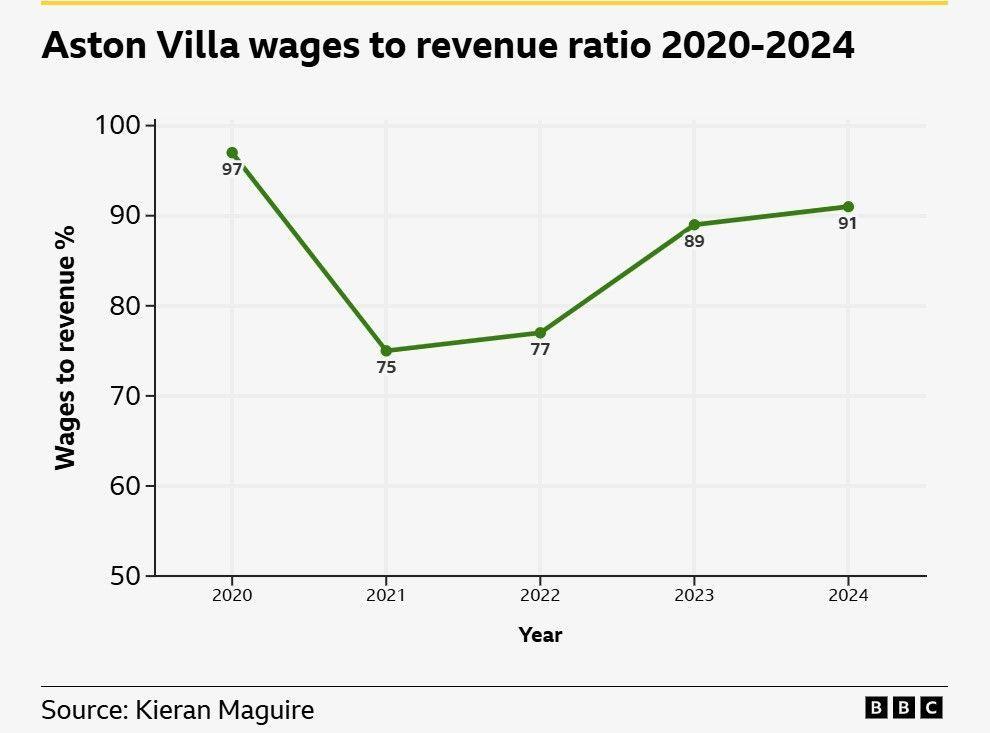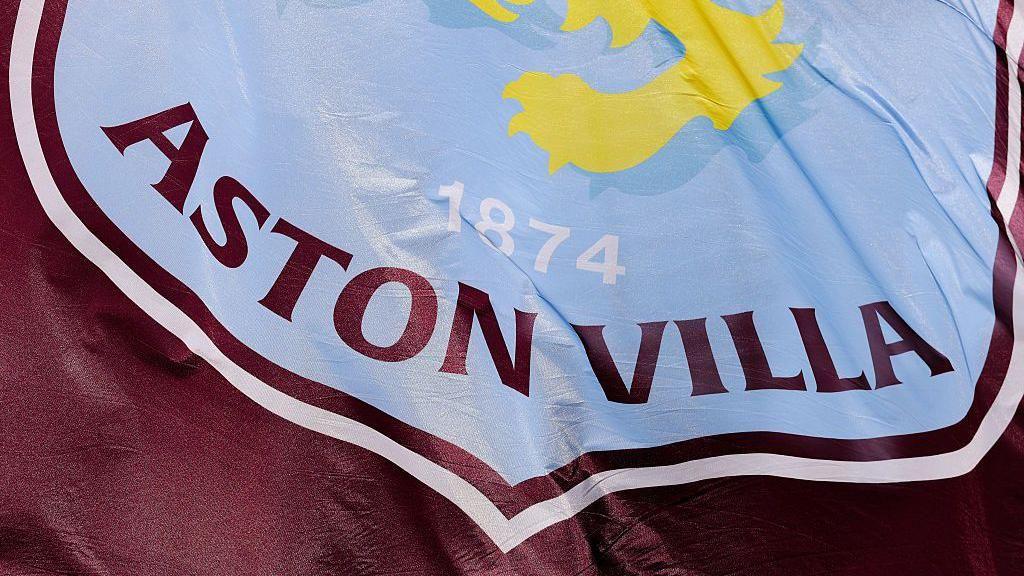PSR or mismanagement? Villa face harsh financial reality
'It's not sitting right' - How do Villa handle PSR situation?
- Published
Aston Villa and Newcastle United supporters chanted together at Villa Park on the opening weekend of the season. They wanted to make their shared feelings known about the Premier League's financial restrictions.
Those supporters, more than any other in the division, feel they have been the victims of the competition's profit and sustainability rules, which they claim protect the 'big six' - Manchester United, Manchester City, Arsenal, Chelsea, Tottenham and Liverpool.
The coarse language deployed left no doubt about their views, and Villa's away fans aired their frustrations again as the team's shaky start to the season continued with a 1-0 defeat by Brentford on Saturday.
With £30m Ivory Coast forward Evann Guessand as Villa's sole major first-team addition this summer, there is no doubt that Unai Emery's side have been hamstrung by the financial rules.
But to what degree have the club contributed to their financial difficulties?
How does PSR affect Villa?
Villa, like every other club in the division, have to adhere to profit and sustainability rules (PSR) or they could face a points deduction.
The rules state that clubs cannot post losses of more than £105m over a three-year reporting cycle.
After points deductions for Everton and Nottingham Forest in the 2023-24 season, every Premier League club was compliant in the campaign that followed - including Villa.
However, Emery's side have had to move on a number of high-profile players in recent times - such as Douglas Luiz, Jhon Duran and Leon Bailey - as they work to remain compliant.
That is despite the club thriving under Emery, with the Spaniard guiding his side to seventh in the 2022-23 season after arriving in mid-season to replace Steven Gerrard, before qualifying for the Champions League in the next campaign.
Last season, Villa narrowly missed out on back-to-back Champions League qualifications by finishing sixth, on inferior goal difference to fifth-placed Newcastle United.
Having signed Marcus Rashford and Marco Asensio on loan on big wages in January, the club were looking to finish in the Champions League positions to maintain their spending.
But failure to do so has squeezed the club's finances, affording them little room to invest in the squad.
Former Aston Villa defender Micah Richards said on BBC Match of the Day: "They need a little bit of freshness.
"With all the hard work they have put in over the years - I was in a team that was relegated so to see the transformation to now, getting into the Champions League, but they can't buy any players, it is ridiculous and having to sell academy players as well. It just doesn't sit right."
'PSR rules killing the game'
The Premier League's financial rules are designed to promote financial stability by preventing overspending, in the hope this stops clubs collapsing.
However, one element of the rules that has been criticised is the 'pure profit' that can be obtained by selling players that have come through a club's academy.
More than £1.9bn has been raised through the sales of academy players across the Premier League since 2020 - with Aston Villa making the second most (£246m) behind Chelsea (£365m).
In effect, there is more to be gained from selling a player that the club have produced than there is in transferring one that they have purchased.
"You're killing the game for young local players who want to play for their team. It is so unfair that they are the bail-out," former Villa defender Stephen Warnock told BBC Radio 5 Live.
"The only way Villa can now progress is make the stadium bigger, get more people into the stadium and commercially hope that brings extra money.
"Can Aston Villa develop? Can they go anywhere with the PSR restrictions that are in place. That's a real issue."
Former England striker Alan Shearer said on BBC Match of the Day that Villa are being "hampered" by the rules.
"PSR doesn't sit well with me in terms of what they can and can't spend. Emery has had six windows and they've made a £10m profit," Shearer said.
"PSR wasn't brought in for this situation when they have an owner with money – like Newcastle."
Jacob Ramsey became the latest Villa academy product to be sold when he moved to Newcastle in a £40m deal on 17 August.
Villa captain John McGinn criticised the league's financial rules following Ramsey's departure, saying: "A sad day losing a top player and person and one of our own but it seems to be the way football is set up these days!"
A problem of Villa's making?
While Villa have had to make some tough decisions to comply with the rules, they are far from the only club to do so.
Arsenal have parted ways with academy products Eddie Nketiah and Emile Smith Rowe; Manchester United sold Scott McTominay, Anthony Elanga and Dean Henderson; while Manchester City allowed Cole Palmer to join Chelsea. For their part, Chelsea have sold Mason Mount, Conor Gallagher and Tino Livramento.
Since their promotion back to the Premier League in 2019, Villa have spent more than £700m.
But the main restriction on Villa's spending is their wages-to-revenue ratio, which was 91% in 2024.
Tottenham, by comparison, spent less than half (46%) of their revenue on wages, while Manchester United and Arsenal were at just over half (51%).
In Villa's position, the club faced a difficult decision.
Do they continue to pay the wages to attract supposedly better players that could help the club achieve Champions League football, or do they reduce the wage bill and theoretically weaken the squad?

Aston Villa's wages-to-revenue numbers between 2020 and 2024
Villa walking a financial tightrope
Villa were fined £9.5m by Uefa in July for breaching the European governing body's financial rules last season, including spending more than the permitted 80% of income on player wages.
Reports claim they have also agreed to sell their women's team to parent company V Sports to comply with PSR limitations.
"There are rules which are pretty much unfair if you ask me," said Villa captain McGinn when asked about PSR earlier this month. "We have got owners who want to invest in the team and want to spend to kick the club on, but they are not allowed to do it."
Since Emery took charge in November 2022, he has overseen six transfer windows.
In that time, Villa's spend has been negative, with the club making £10.7m more than they have spent.
Chelsea's net spend, in comparison, totals more than half a billion pounds in that time.
But Uefa's rules differ to the Premier League's, and Villa must be compliant over the next three years to avoid a further fine of £12.9m.
Speaking after the defeat by Brentford, Emery admitted the club may need to sell more players before bringing in others.
"We have to clarify some circumstances we have in the transfer window," said the Spaniard.
"We have enough players, but we need to clarify with some players if they are staying or not, and the possibility we can add some to help us."

